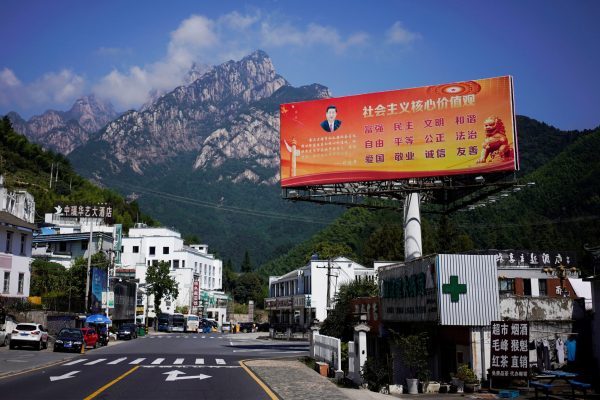This may be seen as the return of Mao-style personalised politics. But more importantly, it characterises an ideology capable of justifying absolute rule of the Chinese Communist Party (CCP), laying the theoretical groundwork for an authoritarian single-party regime.
The unmitigated supremacy of the CCP and socialist rule of law are forged through a dual emphasis on ‘governing the country in accordance with the law’ and ‘moral principles’. These principles set the ideological foundation of the integration of law and morality for a new era.
Amalgamating law and morality is nothing new to China. For millennia, governing by moral code was at the core of imperial China’s Confucian–legalist statecraft. Both Confucian and legalist governing principles reject the acknowledgement of individual desires to pursue self-interest — believing it to lead to nothing but selfishness and corruption. Nor do they trust individuals as autonomous moral agents.
Confucian governance assumes an intrinsically moral ruler and the malleability of human nature through repetitive practice and the performance of moral principles. These practices are demanded of individuals in order to realise their ‘true’ humanity, hence the Confucian focus on li, decorum and ritual proprieties.
Legalism, on the other hand, emphasises the absolute power and authority of the ruler and uniform enforcement of punitive codes intended to curb corruption. Under the imperial dynasties, penal codes worked to reinforce Confucian moral principles, reflecting a Confucianisation of law.
The deep-seated influence of China’s ancient law-morality dialectic has resulted in the moral cultivation of individuals remaining high on the political agenda today. Many social problems and policies are framed in terms of suzhi, the citizens’ intrinsic moral quality. This approach to policy justifies the moral construction campaigns that set out to raise citizens’ suzhi, remoulding and transforming each of them into a new socialist person. While these moral campaigns have legalist roots, they were separate from the legal and judicial system — until the Xi Jinping era.
In the Xi era, the marriage of law and morality has become an integral part of building the Chinese socialist rule of law system. This amalgamation is achieved through incorporating a prescribed moral code, known as socialist core values, in all legal and judicial processes. The 12 designated moral principles are the national values of prosperity, democracy, civility and harmony; the social values of freedom, equality, justice and rule of law; and the individual values of patriotism, dedication, credibility and friendship.
In 2013, the CCP Central Committee issued the first government directive on socialist core values, requiring them to be integrated across the full range of administrative processes and social activities at all levels of government. The 2014 Decision of the CCP Central Committee’s Fourth Plenum of the 18th Party Congress was the first government document to link socialist core values to developing laws. It defined the meaning of governing the country in accordance with moral principles as ‘forcefully carrying forward the socialist core values, carrying forward China’s traditional virtues, fostering social morals, professional ethics, household virtues and personal character’.
In December 2016, the CCP Central Committee and State Council issued a policy document titled ‘Guiding Opinions on Further Integrating Socialist Core Values into the Construction of Rule of Law’, highlighting the importance of making all laws, regulations and public policies guide the value orientation of society. On 7 May 2018, the CCP Central Committee announced a plan to ‘fully incorporate socialist core values into all legislation’ within five to ten years. The plan identified ‘governing the country in accordance with the law’, and ‘moral principles’ as the two most distinctive features of the China-style socialist rule of law.
In response to these party directives, the Supreme People’s Court (SPC), China’s highest court, and the Supreme People’s Procuratorate have subsequently issued guidelines demanding that socialist core values be implemented in courts and everyday caseloads. The SPC published representative cases as guidance for courts to embed these values in their judgements.
These action plans turn an abstract ideology into a living reality. Xi Jinping has repeatedly stressed the uniqueness and independence of the Chinese legal family as an alternative to the commonly accepted major legal families around the world including civil law and common law systems. Linking traditional political culture to party culture, the increasingly formalised law–morality amalgam has served to elevate the CCP’s presence in China’s moral and spiritual landscape.
Today, posters and billboards featuring the socialist core values are prevalent on roads, in public spaces and on buildings throughout China. Schoolchildren are required to recite these values. Social control mechanisms to implement the values have become a necessity — as one poster in Nanjing reminds citizens: freedom is not a wild horse; freedom requires the control of reins and a rider.
Delia Lin is Senior Lecturer in Chinese Studies at the Asia Institute of the University of Melbourne.
This article appeared in the latest issue of East Asia Forum Quarterly — ‘Chinese realities’ — Vol. 11, No. 2.

